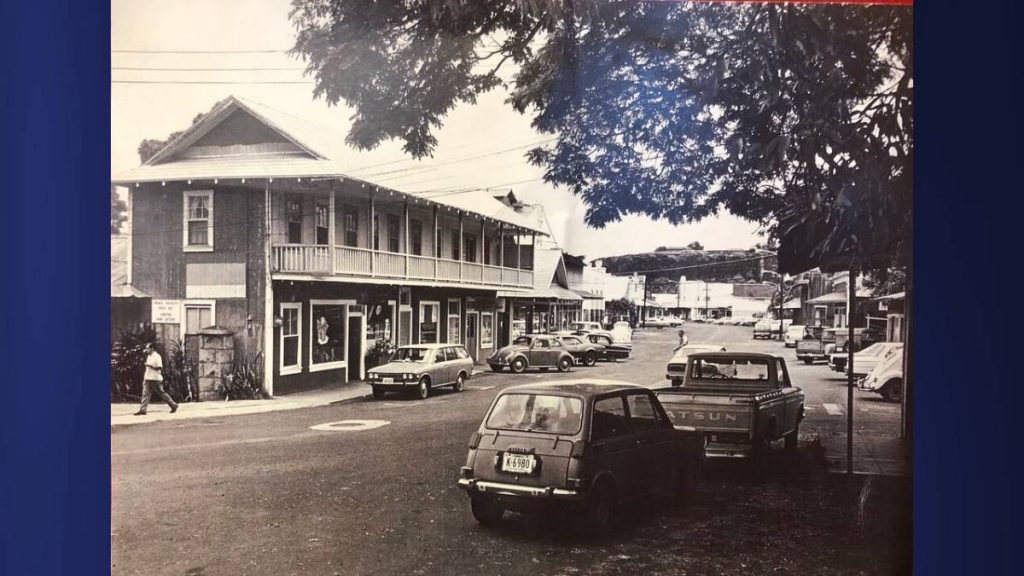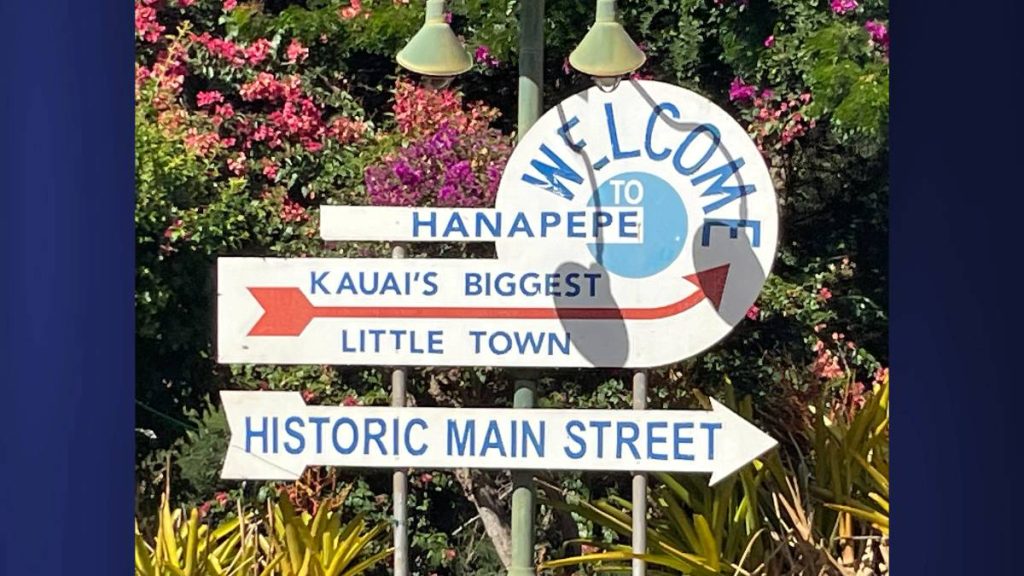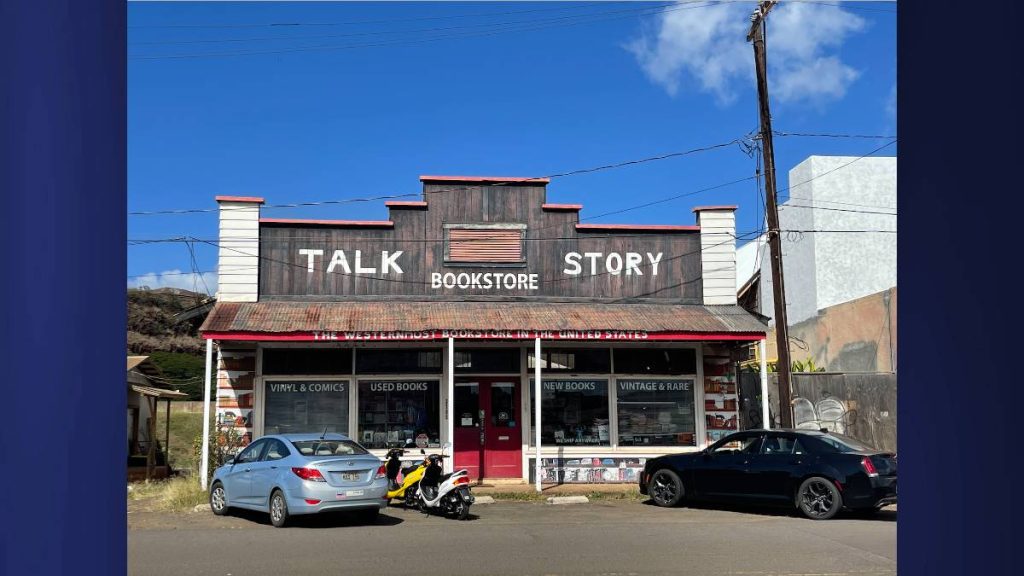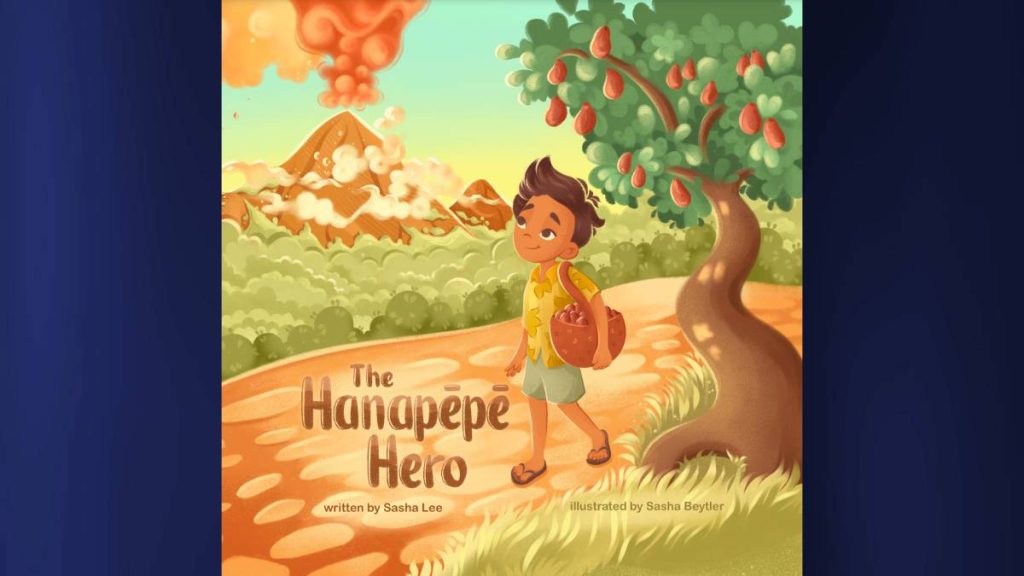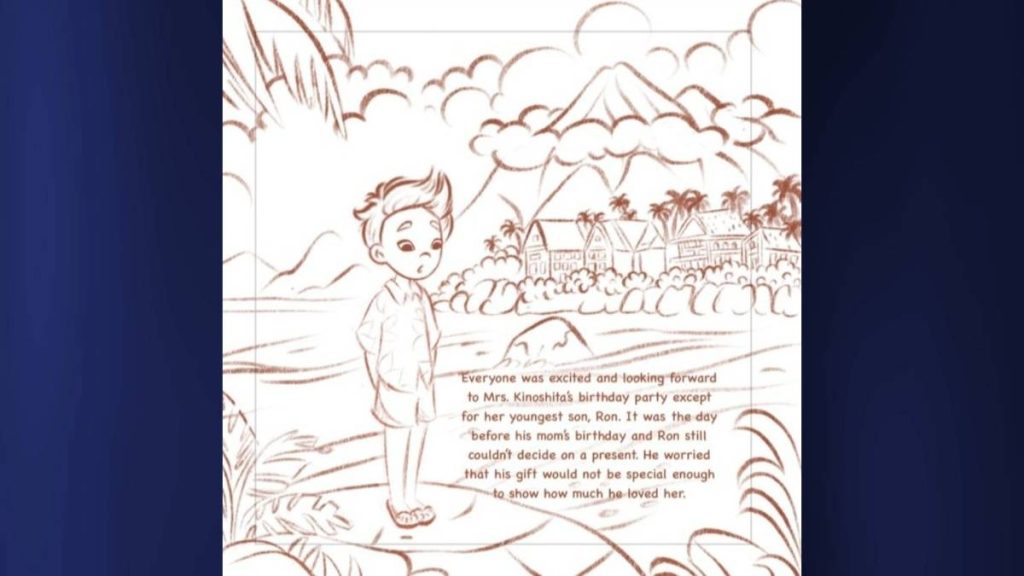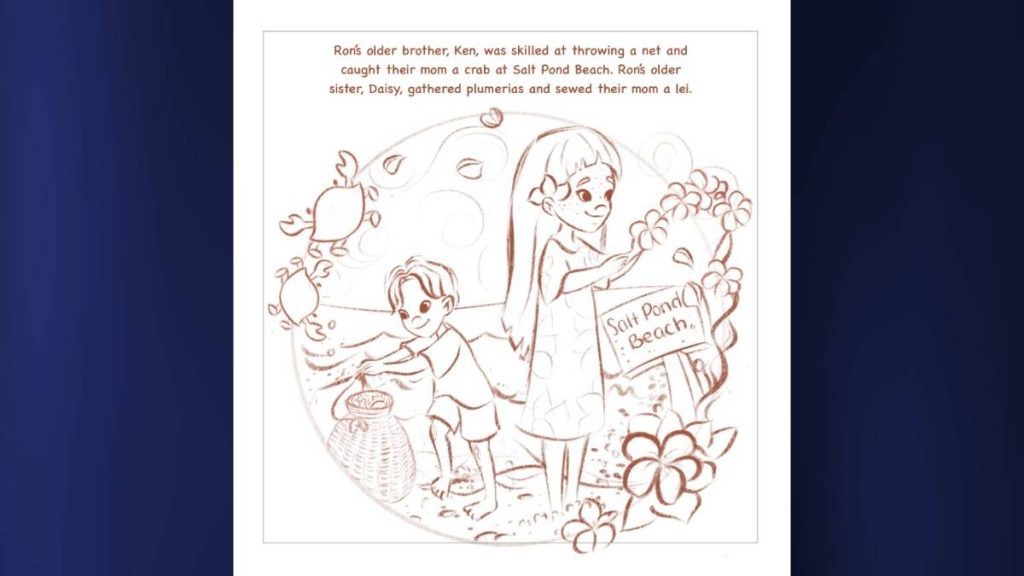Los Angeles teen supports literacy, real-life heroes of Hanapēpē through children’s book

English is not Los Angeles teenager Sasha Lee’s favorite subject. She prefers economics. But the 17-year-old high school senior is supporting a community on Kaua‘i over 2,500 miles away – through a children’s book inspired by her late grandfather’s childhood during the Hawaiian plantation era.
Lee’s 25-page hardback book – titled “The Hanapēpē Hero” – follows a fictionalized version of her grandfather Ron Kinoshita, who died in 2017 at the age of 73, as he walks across the Garden Isle in search of a birthday present for his mother.
“The Hanapēpē Hero” was first published in August 2023. But it only just hit the shelves of the Garden Isle’s only bookshop, Talk Story Bookstore in Hanapēpē, on Jan. 18. It sold out two days later.
“I’m definitely going to be ordering plenty more … It’s a nice heartwarming story. It’s got beautiful illustrations, is very colorful and eye-catching,” said bookshop owner and operator Ed Justus. “Both children and adults seem to be attracted to it.”
Lee’s book – set in the same South Shore town in which Justus now sells it – is aimed at children in kindergarten through second grade. All net proceeds generated through its sale are donated to Hawai‘i organizations dedicated to education and literacy.
Lee – although born, raised and still living in California – has visited family in Hanapēpē up to twice a year, every year since she was a small child.
As a youngster in her grandparents’ Kaua‘i home, she would listen as her grandfather regaled her with tales of Hanapēpē during the island’s now-gone plantation era.
“I grew up listening to stories about my grandfather’s parents working on the sugarcane and the pineapple plantations, and their role in agriculture,” Lee said. “He just loved it there. He would always tell me stories about growing up … He was not the most well-behaved of kids. He would tell me about stealing abalone from the local shop.”
While alive, Kinoshita would also highlight the differences between his beloved Hanapēpē of the past and the Hanapēpē of the present.
“It would always make me sad to hear about the bustling place that he was talking about. Like, all the community lū’aus they would have after a harvest,” Lee said. “It’s still a great community, but it’s definitely not the same.”
The idyllic world described by Kinoshita – combined with a conversation held with an auntie two years ago – inspired Lee (then 15 years old) to write what would become “The Hanapēpē Hero.”
Lee’s auntie, a former teacher at ‘Ele’ele Elementary School near Hanapēpē, told Lee she believed her students often struggled with reading and literacy.
One in six Hawai‘i adults struggle with reading and writing – a statistic roughly on par with the national average – according to 52-year-old statewide nonprofit Hawai‘i Literacy.
“I knew that I wanted to do something about it and do something that would benefit this community that I feel my family has such a strong tie to,” Lee said.
Fittingly, Lee turned to writing to accomplish her mission.
“I created a children’s book, not only for people to learn about [Hanapēpē] but also for the local youth to read a story that they’re actually in and can relate to,” she said.
In the “The Hanapēpē Hero,” the protagonist Ron visits several culturally significant locations on Kaua‘i. During his travels, he finds red berries that turn out to be coffee. His discovery of the berries – and the delicious drink they make – sparks positive change within his town.
“Any kid that reads it, I want them to understand … they can be a hero no matter who they are,” Lee said. “[It’s] about the idea that if you’re thoughtful, care about your community and have intentionality, you can become a hero in your community.”
Currently, ‘Ele’ele Elementary School (which the real Ron Kinoshita attended as a child) and Hawai‘i Literacy are the sole beneficiaries of “The Hanapēpē Hero.” Eventually, Lee would like to expand book sale donations to Hawai‘i cultural and sustainability groups, as well.
“At ‘Ele’ele school, that’s our focus: Literacy. Whether it’s in reading, writing, speaking or listening,” said Principal Allison Carveiro. “[Lee’s donations] will probably go toward our library … I was just taken aback by her generosity.”
According to Carveiro, ‘Ele’ele Elementary School does well in assessments regarding its students’ literacy.
“But we know that reading crosses all content areas: You have to read for math and sciences and social studies … That’s why we focus on literacy in general. Not just reading, but reading, writing, speaking and listening. All four facets of literacy,” Carveiro said. “Because this is what will take them all the way through middle school, high school and into adulthood.”
Carveiro believes some children throughout the State of Hawai‘i may struggle with developing a love of reading, as much as they may struggle with the act itself.
“Reading is maybe not first and foremost. We play a lot of sports. We have a lot of outdoor time,” she said. “I don’t know that it’s the struggle of reading as much as [an issue of] accessibility to libraries and to books, or just having someone read to them.”
Jill Takasaki Canfield, executive director of Hawai‘i Literacy, said funds received through Lee will likely fuel some combination of the nonprofit’s five programs: Adult Literacy, Bookmobile, English Language Learner, Family Literacy Libraries and Digital Literacy. Most of these initiatives are available throughout the state, although the nonprofit – which logs over 50,700 hours of service to help over 5,000 individuals per year – is most active on O‘ahu and the Big Island.
Jessica Gormley, Hawai‘i Literacy’s adult literacy coordinator on Kaua‘i, pairs volunteer tutors with residents who wish to improve their education. These tutor-student relationships – some of which span 10 years, according to Gormley – can be transformative.
“Think about how many times a day we read without even noticing it. If that’s a challenge for you, it can really make life more difficult, especially if it’s a medical issue and you need to look at your prescription, or just get around and to be able drive,” Gormley explained. “It’s hugely important and really can be very rewarding and life-changing when you see people making strides.
“[Kaua‘i learners] who do get help have accomplished amazing things,” Gormley said. “That includes getting their GED; U.S. citizenship; better jobs; better pay … I even have a learner who recently moved into a better place, secured a lease and was able to work with her tutor to figure out how that needed to be signed. [These are] important things in people’s lives.”

As for Lee, she is already working to expand the mission and impact of “The Hanapēpē Hero” through its website, thehanapepehero.com. There, visitors will find children’s activities and an ongoing series of “Community Spotlight” interviews, which profile local community organizations and leaders working to benefit Hanapēpē.
“I want to show people who read the book … the modern-day parallels of someone who is like Ron, or the real-life actualization of him,” Lee said. “The purpose of these interviews is to highlight people who are heroes in their community.”
Currently, only one Community Spotlight has been published on Lee’s website. It features Emilio Ruiz-Romero of Resilient Roots, a grassroots agricultural company.
“He actually has a program for local farmers, where he lends out plots to land. He’s trying to teach them about entrepreneurship as well as food sovereignty for the community,” Lee said.
Forthcoming Community Spotlight profiles include the Hanapēpē-based leader of the Kaua‘i Community Science Center and Lynn Danaher, who is transforming Hanapēpē’s defunct Aloha Theatre into the Aloha Theatre Inn, a multi-use hotel.
“Living in LA … I would always see Hanapēpē as a very community-oriented place where everyone knows each other and everyone cares about each other. People are dedicating their lives to supporting Hanapēpē and education in this area,” Lee said. “Whereas in my day-to-day life, I’ve lived in this metropolitan city where things aren’t as community-oriented … It’s just not quite the same to what I’ve ever experienced in Hanapēpē. I think that I truly see everyone there as my family, which is why I’ve been so drawn to it.”
Lee – who attends Harvard-Westlake School in Studio City – is also embarking on a new adventure: The college application process. She anticipates majoring in economics and business. She sees “The Hanapēpē Hero” book and its associated nonprofit as her first business endeavor.
“I like to call it my little mini-social-impact thing,” she said. “I feel a connection to the land … I feel my family has always instilled that in me because of our roots. So I’m interested in agricultural business, but I’m just not sure where yet.”
- “The Hanapēpē Hero” is available for sale at several Los Angeles booksellers, as well as Talk Story Bookstore and online at barnesandnoble.com and thehanapepehero.com.
- Prospective learners or volunteer tutors interested in joining the Hawai‘i Literacy Adult Literacy Program can find registration links here.
The Hawai‘i Literacy homepage, which links to information on all of the nonprofit’s five programs, can be found here.
Kaua‘i Adult Literacy Coordinator Jessica Gormley – who is available for presentations to community and church groups – can be contacted directly by email at jessica.gormley@hawaiiliteracy.org or by phone at 808-639-6844.



